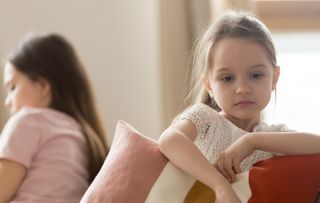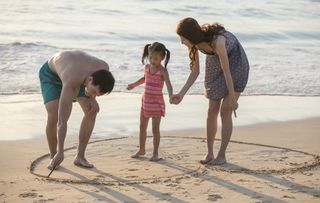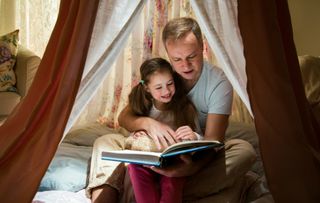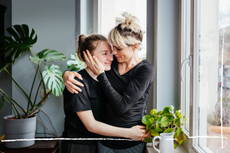Co parenting: how to make shared parenting work after a separation
Your relationship may not have worked, but your parenting can still succeed: here are the 12 golden rules of co parenting.

Your relationship may not have worked, but your parenting can still succeed: here are the 12 golden rules of co parenting.
Every year in the UK, more than 120,000 families separate due to many reasons for divorce, meaning one in three children will experience a family breakdown.
Family separation isn't easy for parents or kids. Everyone in the family feels a tremendous sense of loss and anxiety at the thought that the family as they know it, will no longer be the same.
Child and family therapist, Meri Wallace, says that in order for parents to be of the best help to their kids, they need to work with their own emotions, especially a common guilt they feel towards their children.
"It is helpful for parents to recognise that pairing up for life is one of the hardest things to do in the world and as a result, divorce [or separation] occurs. It is nothing to be ashamed of. In many cases, it is better for everyone involved to sever a relationship that is causing grief.
"Children experience a great deal of anxiety when they live with constant parental discord. In fact, in many situations, children do better when they relate to each parent alone in a healthier environment. If parents accept their decision and present it as natural part of life, they can help their kids to overcome the difficulties."
According to Gingerbread, the charity for single parents, 65% of 'resident parents' say their children have direct contact with the other parent. By putting the children’s needs first, both parents can continue building relationships with their kids, encourage healthy child development and work together to do their best for their children.

Parenting after a separation
When parents divorce and move into separate homes, children can become anxious that they’ll lose touch with either mum or dad, or that their relationship with them may never be the same again.
Allowing children to continue spending time with both parents through c0 parenting can make them feel less like they have lost a parent, or that they have to take sides. It also gives them much needed time to continue building relationships with both their parents individually.
What is co parenting?
The term 'co parenting' was coined to describe a parenting relationship in which the two parents of a child are no longer romantically involved, but still assume joint responsibility for the upbringing of their kid.
In co-parenting arrangements, both parents choose to put aside their personal differences to develop a parenting plan that is in the best interest of their child's development. Healthy co parenting relationships usually require ongoing communication and mutual responsibility over the care of your child, so can prove difficult following the demise of a relationship.
If you and your former partner can manage to put your differences aside, however, your child will be able to reap massive benefits from an effective co parenting relationship.
Parenting time arrangements
A parenting time arrangement is a schedule that outlines when mum and dad will be looking after the kids. It sounds formal but it can provide a useful structure when caring for children after a separation.
The time kids spend with either mum and dad will of course vary according to their ages and needs. With very little ones, it may be easier for them to have their main home in one place, as splitting a child’s time 50/50 can place extra stress on their shoulders while they are learning to manage the practicalities of friends and school, according to experts at clickrelationships.org.
At the same time, when kids are very young, they are still constructing relationships with both their parents and benefit from spending ample time with both mum and dad, so it is vital that they are given time to develop these family bonds, which will help them to develop long-standing trust and friendships in later life, according to co parenting site ourfamilywizard.com.
Even if a parent is physically apart from the rest of the family, technology can play a huge part in helping families to stay connected. Phone, Skype/FaceTime, text and email can all help kids to reach out to parents, whenever they need to, when they are apart from them.

The 12 DOs and DON’Ts of successful co parenting:
If you and your ex have agreed to share the parenting of your children after a split, there are some vital rules that will help make the co parenting arrangement successful for everyone involved.
DO create an open dialogue with your ex. Keeping each other informed of schedules, developments and events that have or might yet affect the children is essential in making the relationship work. "Although it may be emotionally painful, make sure that you and your ex keep each other informed about all the changes in your life, or circumstances that are challenging or difficult," says psychologist Dr. Deborah Serani (Psychology Today). "It is important that your child is never, ever, ever the primary source of information."
DO make the rules in both households consistent: children need routine and structure. Meal times and bed times, chore and homework rules should all be the same in both homes. "Running a tight ship creates a sense of security and predictability for children. So no matter where your child is, he or she knows that certain rules will be enforced," says Serani. "You know the deal, before we can go to the movies, you've got to get that bed made." Research shows that children in homes with a co parenting approach have greater sense of wellbeing.
DO speak positively about your ex. Expert after expert (most of whom were divorced themselves) repeated this. "Badmouthing your ex will be internalised by your child because they are made up of both you and your ex," says David Pisarra, fathers' rights lawyer and author of A Man's Guide to Child Custody. "What you say about your ex is what the child will react to, and also think about themselves." Remember, even though you may be furious with your ex, your child still loves him or her as a parent.
DO be realistic about your own schedule and commitments. "Often during a separation or divorce, parents make unrealistic custody grabs based on fear or insecurity," says Laura Wasser, a celebrity divorce lawyer in Los Angeles and author of It Doesn't Have to Be That Way. "Instead, look at custody as a business arrangement. Remove your emotions from the situation and look at the facts."
DO realise that a bad partner doesn't equal a bad parent. Your ex may have driven you mad, but Wasser reminds her clients that "even though he or she may not have been a good partner, it is still possible for him or her to be a good parent." In most cases, it is unquestionably best for children to have frequent and continuous contact with both parents, says Wasser. "Your marriage may not have worked, but your parenting can still succeed."
DO know that your ex loves your kids. "For good or bad, the child wants and needs to feel the love of both of parents," says Wasser. "Remember that when the children are with your ex, they are with the one person in the world who loves and cares about them as much as you."

DO recognise that co-parenting is challenging – and know that you are doing this for the needs of your children. The divorce was about your relationship, the shared parenting is about your children.
DO "Be boring." Says Serani. "Research shows that children need time to do ordinary things with their less-seen parent, not just fun things."
And DO review the shared parenting arrangement and adjust as needed from time to time. Just as your kids will grow and change, so should your arrangement. "Many parents find it helpful to review their agreement and assess how it is working, particularly as children grow and circumstances change," says Dr. Pedro-Carroll. You and your ex may change too. "If you are hoping to eventually get to an equal time share arrangement but have not historically spent as much time parenting, gradual increases are recommended," says Wasser.
DON’T expose children to conflict. Research shows that putting children in the middle of your adult issues promotes feelings of helplessness and insecurity, causing children to question their own strengths and abilities.
DON’T be an unbalanced parent. "Resist being the fun guy or the cool mum when your children are with you," says Serani."‘Doing so backfires once they return to your ex - and sets into motion a cycle of resentment, hostility and a reluctance to follow rules for all involved." Remember that children develop best with a united front. "Co-parenting with a healthy dose of fun, structure and predictability is a win-win for everyone."
DON’T accuse. Discuss. Never remain quiet if something about your ex's co-parenting is troubling you. "The best approach when communicating is to make your child the focal point," says Serani. “‘I see the kids doing this-and-that after they return home from their visit. Any ideas of what we can do?" Notice there's not one ‘you’ word in there. No accusatory tone or finger-pointing either."
When co-parenting doesn’t work…
Mediation can be a big help. The National Family Mediation Organisation can assist parents to develop a co parenting plan if communication is getting difficult. If mediation is being considered by the parents and the children are older, it can be helpful to encourage them to take part in the process.
Family involvement helps parents to really hear what their children are saying and can reduce any feelings of anxiety or stress they may be experiencing.
Goodto Newsletter
Parenting advice, hot topics, best buys and family finance tips delivered straight to your inbox.
-
 The adorable sign Prince Louis can’t wait to be a future King like his brother Prince George
The adorable sign Prince Louis can’t wait to be a future King like his brother Prince GeorgeThe Wales youngster made a telling move during a secret visit to the Strictly Come Dancing studios
By Selina Maycock Published
-
 This baby name is giving 'retro chic' vibes and it's predicted to be a top choice for parents in 2024 – would you choose it?
This baby name is giving 'retro chic' vibes and it's predicted to be a top choice for parents in 2024 – would you choose it?It’s stolen the limelight right at the last minute
By Daniella Gray Published
-
 "I appreciate your opinion, but you've got to calm down" Beyoncé's gentle parenting technique has gone viral and the internet is loving it
"I appreciate your opinion, but you've got to calm down" Beyoncé's gentle parenting technique has gone viral and the internet is loving itA clip from Beyoncé's new Renaissance film shows her engage in gentle parenting after a debate with Blue Ivy over the tour setlist - and the internet loves her for it.
By Lucy Wigley Published
-
 How to dress a baby for sleep - 5 top tips, including what tog sleeping bag is best
How to dress a baby for sleep - 5 top tips, including what tog sleeping bag is bestHow to dress a baby for sleep can be a daunting task - that is why we are here with 5 tips to make it easier, including what tog sleeping bag is best.
By Lucy Wigley Published
-
 Is there anything Kate Middleton can’t do? 3 reasons why this question is so damaging to mums
Is there anything Kate Middleton can’t do? 3 reasons why this question is so damaging to mumsLet's stop saying this. Please.
By Heidi Scrimgeour Published
-
 How to turn your iPhone into a white noise machine for babies
How to turn your iPhone into a white noise machine for babiesFind out how to turn your iPhone into a white noise machine for babies, thanks to this new Apple feature
By Ellie Hutchings Published
-
 Biggest baby name regrets reveal important 'lesson' parents need to follow
Biggest baby name regrets reveal important 'lesson' parents need to followA list of the top ten most commonly changed baby names in the US have been published and the results might surprise you
By Emma Dooney Published
-
 Talking about school shootings with your kids - tips from the experts
Talking about school shootings with your kids - tips from the expertsBy Stephanie Lowe Last updated
-
 Who pays for maternity leave – the government or your employer?
Who pays for maternity leave – the government or your employer?Taking time off work to have a baby can work out expensive, find out who pays for maternity leave with our guide.
By Rachel Lacey Published
-
 How to talk to kids about coming out as gay, lesbian or bisexual
How to talk to kids about coming out as gay, lesbian or bisexualHow to talk to kids about coming out as gay, lesbian or bisexual are important conversations. These are The Proud Trust's top tips to get started.
By Grace Walsh Last updated